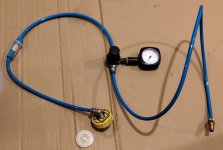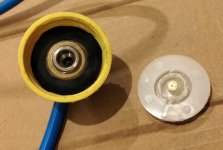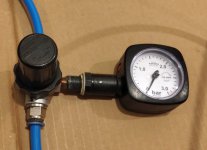No disrespect, but as you appear to be on a learning curve re this job, may I suggest you do what you did before with full reservoir , open the bleeder and allow flow until clean fluid come out, then nip up bleed nipple and try the pedal, assuming it doesn't feel too bad then get your missus to press the pedal, but with instructions not to take her foot off the pedal applying pressure, then slacken bleed nipple, hopefully clean fluid with no air bubbles will shoot out, so nip up bleed nipple again, check fluid reservoir and ask missus to gentle remove foot from pedal, try the pedal and if it feels good and firm then with all brake pipe unions tight and clean, get missus to apply a firm emergency stop pressure to brake pedal and hold it there whilst you check for any leaks, if all OK release pedal, complete reassembly and go for a road test where you can safely try the brakes, assuming all good have another look over brakes to confirm no leaks, also no hot or sticking brakes after all the work done.
Note I say "nip up" bleed nipple, it is tiny and easily snapped, it's not there to hold the wheels on

.
Another common problem when using assistant is they don't realise that taking their foot back off the brake pedal whilst the bleeder is open allows air back into the brake system causing more problems. I had less problem getting a 10 year old daughter to follow instructions than a wife who wouldn't be told!

Finally any advise/suggestions I give are just that, so totally your liability, if you are not sure especially about brakes get a professional.
As they say "if a car will not start it's annoying, if it will not stop that is totally different"



.






